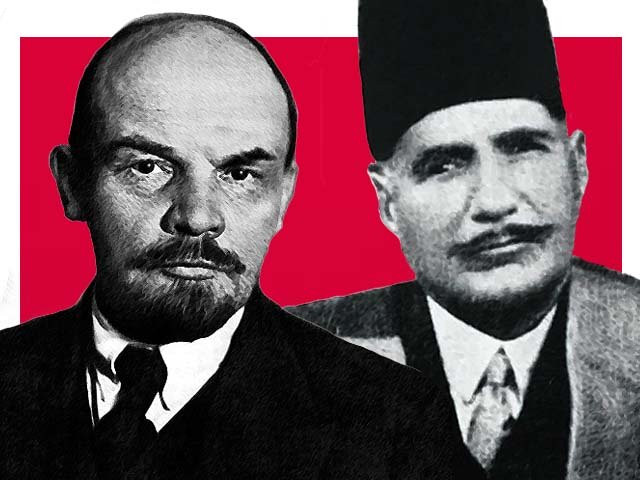Readers may be surprised to know that despite a long progressive tradition in Urdu literature inspired by the events of 1917, not much poetry exists with Lenin as the subject. Thus, on the occasion of Lenin’s 150th birth anniversary today, it would be both useful and instructive to remember that perhaps the most celebrated poem on the founder of the Russian revolutionary state is Allama Muhammad Iqbal’s “Lenin Khuda ke Huzoor Mein” (Lenin in God’s Presence), written soon after the revolution took place in Russia. The Soviet poet Vladimir Mayakovsky’s Conversation with Comrade Lenin, written in 1929, is also another notable attempt at a fictional dialogue with the great revolutionary leader. Iqbal was among the first Urdu writers to be influenced by the world’s first socialist revolution in Russia. He was already forty when the Bolsheviks seized control of Moscow. His trilogy of poems in his collection “Baal-e-Gibreel” (Gabriel’s Wing) is the clearest indication of Iqbal’s admiration of Lenin and the Bolshevik experiment. In the first poem of this trilogy, the aforementioned “Lenin, Khuda ke Huzoor Mein”, Lenin complains to God about injustice. This poem includes the verse which has now achieved the status of an aphorism,
“Hen talkh bahut banda-e-mazdur ke auqat” (The hours of the working man are very distasteful)
The second poem “Farishton ka Geet” (Song of the Angels) is a highly rhythmic recitation by angels about what they have witnessed on earth, corroborating Lenin’s complaints.
Lenin holds his ground, accusing God of being ineffectual; while God is not at all upset with Lenin’s impertinence. Instead, in the third poem, “Farmaan-e-Khuda Farishton Se” (God’s Command to the Angels) in response to Lenin’s diatribe, God calls upon His angels to effect a few changes in the organisation of the world at large. Wouldn’t you have liked to be a fly on the wall during that exchange? Thanks to Iqbal, you are. Additionally, this poem used to be learnt by heart by the generation of South Asian leftists coming of age in the 1950s. Given the importance of this poem in Iqbal’s set of revolutionary poetry, as well as the fact that it consists of some highly-stylised Persian words which maybe unfamiliar to the uninitiated, I have taken the liberty to include both the Romanised Urdu in the original, as well as an original English translation of the poem which follows; in order to generate new interest in the poem for a younger readership. Given that today marks the 150th anniversary of Lenin’s birth, and yesterday, April 21st, was the 82nd anniversary of Iqbal’s death, this translation is a unique tribute both to the revolutionary poetry of the latter and the revolutionary practice of the former.
“Uthho meri dunya ke ghareebon ko jagaa do
Kaakh-e-umaraa ke dar-o-deevaar hila do
Garmaao ghulaamon la lahu soz-e-yaqin se
Kunjishk-e-phiromaayaa ko shaheen se lada do
Sultaani-e-jamhoor ka aata hai zamaana
Jo naqsh-e-kuhan tum ko nazar aaye mita do
Jis khet se dah-qaan ko mayassar nahi rozi
Us khet ke har khosha-e-gandum ko jala do
Kyun khaaliq-o-makhlooq mein haayal rahen parde
Peeraan-e-kaleesa ko kaleesa se hata do
Main naakhush-o-bezaar hoon marmar ke silon se
Mere liye mitti ka haram aur bana do
Tahzeeb-e-naveen kaar-gah-e-sheesha-garaan hai
Aadab-e-junoon shaayar-e-mashriq ko sikha do.”
~
“Go bid the wretched of my earth to awake
The foundations of elite palaces should quake
Roil the blood of slaves with the pain of belief
Sparrows should challenge eagles, make no mistake
The moment of democracy is at hand
Signs of the old order I bid thee to break
Burn every ear of wheat of that field from which
The farmer is not permitted to partake
Distance between God and humans is futile
Remove the bishops from the church; they are fake
Build me a simple house with sand, for I hate
Those marble edifices. That’s a mistake.
The new world is but a brittle glass palace
Poet of the East, learn obsession and heartache.”



COMMENTS
Comments are moderated and generally will be posted if they are on-topic and not abusive.
For more information, please see our Comments FAQ